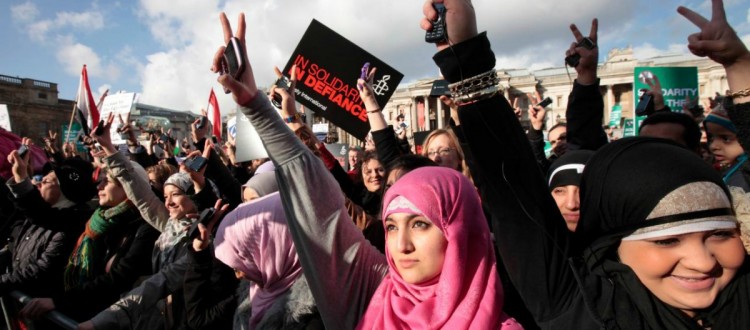Women and the Arab Spring – a dream turned nightmare
Change must start from within each individual. As quoted in the Quran, “Indeed, Allah will not change the condition of a people until they change what is in themselves.”
| Suggested Reading | Conflict Background | GCCT |
By Abdalhadi (Hadi) Alijla
At first, opportunistically then pragmatically, a growing number of us thought that the Arab Spring would enhance women rights in the MENA region.
Though we are acutely aware of the pace of such a development, the speed at which it has deteriorated is quite shocking. The dream of women being effective participants in political, economic and social life in the post-Arab Spring countries has been crushed.
From a blooming chance for women to claim their rights, dreams and be active participants in the political sphere, to smashed spirits that have been left behind hopeless under authoritarian regimes in deeply enshrined patriarchal societies. In countries like Egypt, Bahrain, Syria, Yemen and Palestine, the fight seems to have disappeared.
In some countries, on the surface it appears that women’s rights issues are being addressed, however, a deeper look indicates that it’s only ink on paper, if even that. The day-to-day life of a woman in the Middle East has become unbearable and dangerous.
Leading up to and during the Arab Spring, women were actively leading protests and demonstrations but they were targeted by their regimes in an attempt to squash the uprisings.
In Syria, more than 16,000 women have been martyred and hundreds of thousands either harmed or jailed. In the last year, they were targeted by the so called the Islamic State and the other terrorist groups. The videos, photos and stories being revealed about the practices against women are horrific.
Before Syria’s break into civil war, Syrian women were among the most educated (Literacy rate) in the Arab world, with high rates of political engagement and participation, freedom in life style and more importantly, steps were being taken for political reform in increasing women’s participation in parliament.
However, as the situation continues to deteriorate, Syrian women are now exiled in refugee’s camps in Jordan, Turkey and Lebanon living in dire conditions. The few lucky ones have made it to the platforms of Milano Centrale in the hopes for asylum in Scandinavia.
In Iraq, on the other hand, women suffered from the dictatorship, and their malaise has tripled after the American invasion. Following the eruption of sectarian conflict between the Shiaa and Sunni groups, and the outgrowth of militias, women are paying the highest price as the threats of rape, murder, imprisonment and torture become day-to-day fears.
Women are also deprived from other social rights as the Iraqi constitution delegates women’s rights to the different ethnic groups. The 1949 Iraqi constitution was much more progressive with regards to women rights than the one Iraq has now. Over the years, the discrimination and harassment against Iraqi women has only increased.
In Egypt, women were some of the first to revolt, calling for protests against Mubarak’s regime. They struggled alongside men to get rid of a 30-year dictatorship. However, they are now victims of a political and social struggle.
Although women’s rights were not at the top of the Mubarak agenda, since the fall of the Mubarak regime women rights groups have been further de-legitimized and thrown out of the legal framework.
Since 2013 women have paid a hefty price; the regime has imprisoned hundreds in order to stop protests demanding political and social rights. Shaimaa El Sabbagh, for example, was shot dead during a peaceful march with flowers to Tahrir Square on the anniversary of the revolution in January 2015.
In Tunisia, what seems to be the most liberal country in North Africa, women are not expected to make a breakthrough in political to social rights. In reality, the liberalism that women enjoy could quite easily disappear in a matter of a few years, because what we are seeing now is a result of top-down policies set in place by the former president of Tunisia who called for secularism and not as a result of social interaction and struggle between the different fractions of society.
Similarly in Yemen, Bahrain, Palestine and the rest of the Arab World. The only differences are the numbers of women killed, imprisoned, raped or tortured.
According to Varieties of Democracy Institute (V-dem) women’s access to justice in Arab countries has sharply decreased after 2011. In the absence of access to justice, women are unable to have their voice heard, exercise their basic rights, fight against discrimination and harassment or even be active participants in political and social spheres.
Has the Arab Spring betrayed women? The answer is simple, yes.
No society will ever progress and develop without respecting women’s rights, and engaging women in top-level decision-making. No matter how rich the country is, women are the main pillars of society and their role must be equal to that of men.
For genuine shifts to take place with regards to women’s positions in their respective societies, change must start from within each individual. As quoted in the Quran, “Indeed, Allah will not change the condition of a people until they change what is in themselves.”
Abdalhadi (Hadi) Alijla is a research fellow at the University of Milan, and coordinates research activities at the Institute of Middle Eastern Studies Canada. As a fellow of the Soliya network for dialogue, he was awarded the 30th Alternative Nobel Prize by the Right Livelihood College. He is DAAD fellow of Public Policy and Good Governance.
This article was originally published by OpenDemocracy and is available by clicking here.




















RT @TransConflict: #Women and the #Arab Spring – a dream turned nightmare: Change must start from within each… http://t.co/AHyFeiMcdX
RT @TransConflict: #Women and the #Arab Spring – a dream turned nightmare: Change must start from within each… http://t.co/AHyFeiMcdX
Pingback : The Legalities and Ethics of the Arab Spring Protests | I Like Big Books